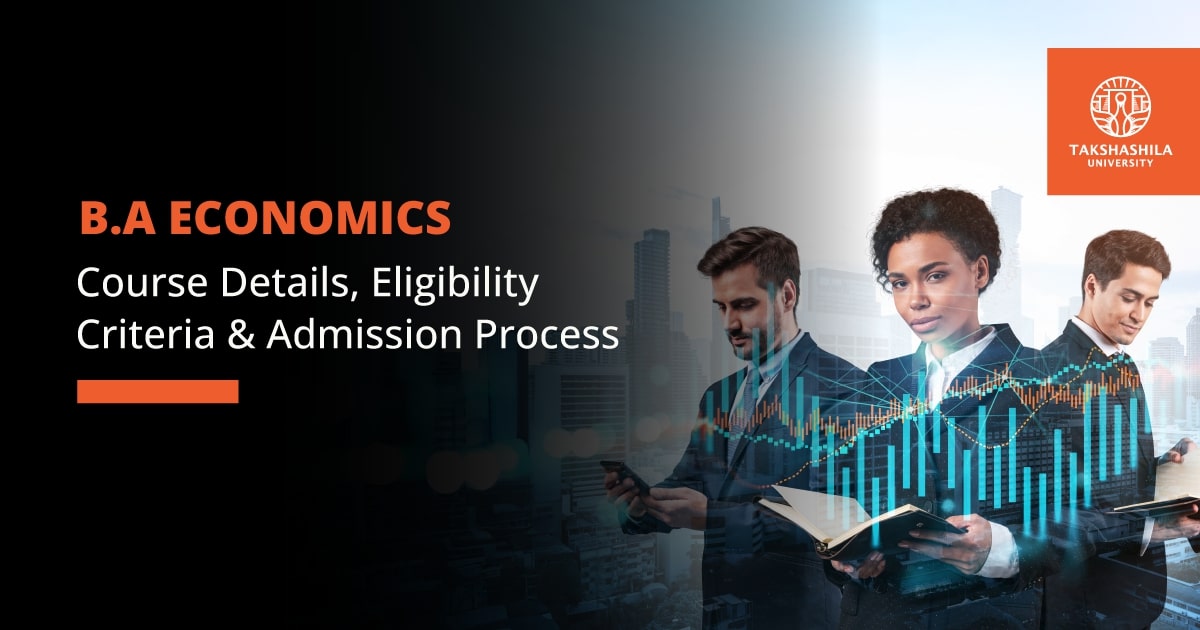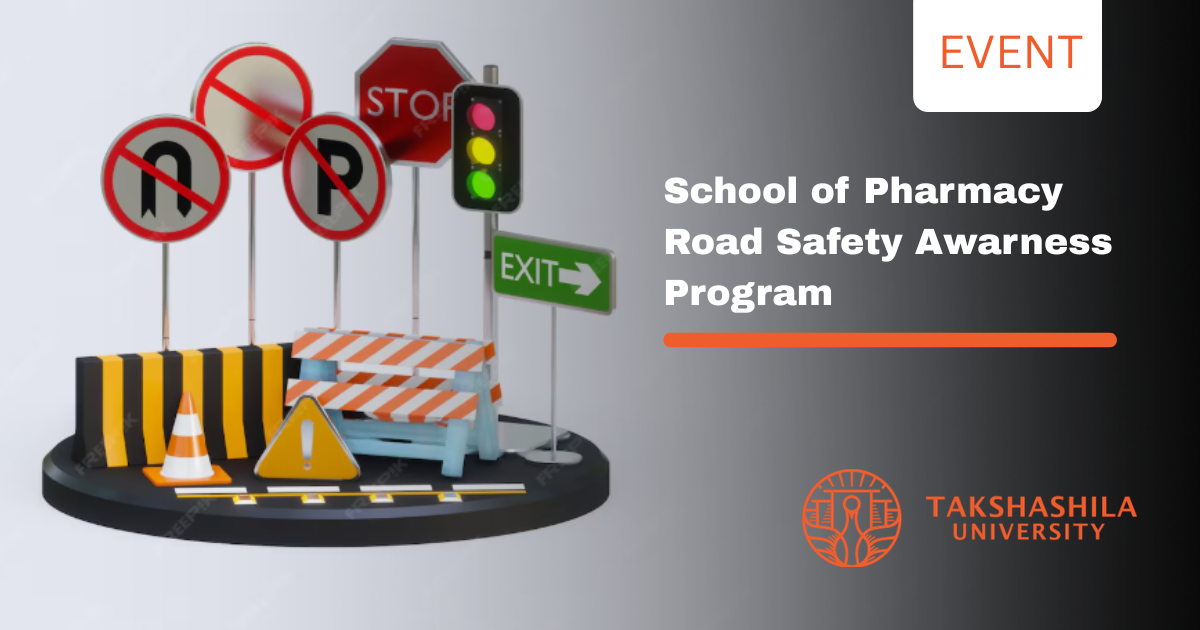Introduction to B.An Economics
BA Economics at Takshashila university — If you want to know how economies operate, how governments make decisions, or what causes industries’ prosperity and failures, and if you are drawn toward discovering the engines of economic development, income earning and policy-making, acquiring a B.A. in Economics could be ideal.
This undergraduate program serves to develop a strong knowledge of economic principles, statistical techniques, and empirical approaches that graduate students may employ in the study of diverse economic problems. No matter the career in government, commerce, finance or research that you would like to pursue, economics has a place in it.
Let’s look at all the details, such as B.A Economics: Course Details, Eligibility Criteria, and Admission Process will be explained in this article.

Overview of the B.An Economics Course
B.A. Economics is a three-year undergraduate program that examines how social, commercial, governmental, and individual actors make resource allocation decisions. Students studying this program complement theory with practical knowledge of economic mechanisms and acquire micro and macroeconomics knowledge.
The first year introduces the learners to basic concepts like microeconomics, macroeconomics concepts, and basic mathematics in economics. Moving on to the second year, topics such as economic theory, international trade, and public finance are explored. Students are introduced to econometrics, development economics, and industrial economics and undertake projects or internships in Year 3 to help reinforce their studies in real-life contexts.
Key Concepts in Economics
- Microeconomics focuses on individual market participants, such as consumers and firms, and their decision-making in the areas of supply and demand, pricing, and competition among various markets.
- Macroeconomics: Deals with the economy in its entirety. It deals with national income, growth and inflation, unemployment, and ideas such as fiscal and monetary policies.
- International Economics: this area of focus investigates international trade, foreign exchange markets, trade relations, and the position of various local economies in globalisation.
- Development Economics is the field that explores the determinants and nature of economic development, emphasising issues such as poverty alleviation, economic structural change, and sustainable development in poor regions.
- Public Finance: This field studies government revenue resources (taxes) and expenditures, as well as the impact of these two factors on the economy.
- Econometrics: Defined as applying statistical tools and techniques on data related to economic variables to evaluate the economic hypothesis and make predictions.
- Industrial Economics focuses on firm behaviour, market form, the level of competition, and governmental intervention in business.
Career Opportunities in Economics
A.A. in economics provides numerous employment options, especially in the public and private sectors. Some joint employment opportunities include:
- Economist: Economists study trends and data to provide businesses, governments, and other organisations with insights that can assist them in making practical decisions. Employment opportunities for them exist in think tanks, research institutions, and even as independent consultants.
- Financial Analyst: Financial analysts are concerned with utilizing the available economic facts to examine investment opportunities and financial risk and guide firms toward profitable investment decisions.
- Policy Analyst: Policy analysts also gather information to analyse implemented policies. Based on their findings and economic theory, they tend to offer suggestions regarding the quality of the government’s plans. Their employers can be any government ministries, NGOs, or research organisations.
- Business Consultant: Consultants work in organisations to advise on operational efficiency, cost reduction, and revenue maximisation based on economic and business considerations.
- Banker: Economics graduates can also work in the banking industry, where they are tasked with product management, lending out loans, investments, consulting, and finance advisory.
- Data Analyst: As the name suggests, data analysts apply statistics and econometrics to study data for trends and provide information that aids organisations in their decision-making processes.
- Civil Services: Several graduates with Economics degrees join civil services and target UPSC competitive examination for various government administrative posts.
- Market Research Analyst: Such professionals research the characteristics of the market and the needs of the consumers. They help companies understand the demand for their goods and services, which is useful for making business decisions.
- Teaching and Research: After completing a B.A. in Economics, one may qualify for employment as a teacher or researcher in universities, colleges, or research institutions.
Eligibility Criteria for B.An Economics
- Educational Qualifications: You have completed your 10+2 or higher secondary education from the streams of Arts or Science. Most institutions expect creative students to have taken Mathematics, Economics, or Business Studies during their higher secondary years and may have yet to have had to do so.
- Minimum Marks: Most colleges have cutoffs of 50-60% in the 12th standard and above. But this may change college or university to college or university.
- Age Limit: This is by far the only course I know with no upper or lower age limit. All competent students can apply regardless of their age.
Skills Required for B.An Economics Students
B.A Economics students also need skills and traits that will assist them in undertaking the course and progressing in their professional careers. These include:
- Analytical Thinking: Economics is an all-time problem, and what you study is how to solve it. Seeing problems in this manner will assist students in practicing economics effectively.
- Numerical Skills: Sound mathematics and statistics are essential for analysing data and economic models, econometrics, and broader financial economics.
- Research Skills: In economics, both qualitative and quantitative research are common. Students and professionals in this discipline also need to be able to pool information, analyse patterns, and break down the reviewed facts, which is a great skill to master.
- Communication Skills: You cannot draft a paper, report, or present the findings of economic research without being able to communicate clearly and persuasively.
- Critical Thinking: As an economist, you would need to analyse several cases, look at possible solutions other than the usual, and even question set ideas most of the time. It can be said that critical thinking has a lot to do with one’s ability to make decisions.
- Attention to Detail: Attention to detail regarding the different data and economic models is crucial in evaluating the economic models to ensure correct analysis and results.
Why Choose Takshashila Engineering College for B.A Economics?
Takshashila Engineering College is an excellent choice for pursuing a B. An in Economics for several reasons:
- Experienced Faculty: The college is well stocked with qualified and experienced faculty who possess both theoretical and practical approaches to the classroom, and the learners find it more interesting.
- Comprehensive Curriculum: The B.A. Economics programme at Takshashila will equip students with thoroughly relevant knowledge. This programme is structured to cover all essential aspects of economics as well as modern techniques like econometrics for data analytics, enhancing the employability of students upon graduation.
- Practical Exposure: Understanding economic concepts and dealing with actual data is essential for students both inside and outside the classroom when solving problems. Therefore, at Takshashila, the students are advised to undertake case studies, projects, and internships that take a more practical, hands-on approach to economic problems.
- Research Opportunities: Research cuts across the core of Takshashila, and students are involved in research projects, which enable them to keep pace with the industry’s most current challenges, especially in economics and policy analysis.
- Industry Connections: The college has a good rapport with industries, government bodies, and NGOs, enabling its students to get internship opportunities and insight into real-life complex economic problems.
Admission Process for B.An Economics
- The admission process for B. Economics usually follows these steps:
- Application Form: Students must download the application form, which can be found on the college’s official website. The form often requires students to indicate personal specifics, academic performance, and phone numbers or email addresses.
- Entrance Examination (if applicable): The entrance examination has to be set forth by some institutions as an additional evaluation of knowledge of economics, mathematics, and culture awareness. On the other hand, some colleges accept students solely on the basis of their performance in the 12th-grade board exams.
- Merit List: After results from the cut-off mark from the entrance examination (IF it was set) and the 12th-grade marks have been marked, the college has to post the results publicly. Only those who score more than the eligibility criteria will advance to the subsequent phase.
- Counseling/Interview (if applicable): Some colleges call interested students for counselling and interviews to evaluate their level of interest in economics and assess their fitness for the program.
- Final Admission: When the students are selected, they are required to go through the admission processes, whereby the documents are confirmed, the fees are paid, and the registration is done.
Curriculum and Course Structure
Here, we are detailing the curriculum and course structure.
- The B.A Economics program is typically divided into three years, with each year focusing on different aspects of economics:
- Year 1: A brief on basic economic concepts like microeconomics, macroeconomics, and statistical measures for economies. It also covers economic history, the history of the Indian economy, and the history of the political economy.
- Year 2: In this year, concepts such as economic theory, international trade, money and banking, and public finance are further pronounced. Since this is an arm of the coursework, practical sessions on data analysis and statistics have become more advanced.
- Year 3: The final year caters to econometrlabourbourr, development, and environmental economics. Students also carry out their projects or internships as part of their practical experience in their respective classes.
Top Institutions for BA Economics
Here are some of the top institutions in India that offer B.A. Economics programs:
- Takshashila college
- Delhi University (DU)
- Jawaharlal Nehru University (JNU)
- St. Xavier’s College, Mumbai
- Mumbai University
- Banaras Hindu University (BHU)
- Loyola College, Chennai
- Madras Christian College
Scope and Future of Economics Graduates
Employment opportunities are clustered in business and finance organisations, government agencies, think tanks, and international and local organisations. The further you advance in your education, you can take a Master of Arts (M.A) or even a doctorate (Ph.D.) in economics for a profession in analysis or lecturing in colleges and universities.
Conclusion
BA Economics is worth emphasizing that the call for economists has increased in new occupations related to data science, behavioural economics, and environmental economics. With organizations at large investing more effort into economic analysis while making important decisions, the profession of economics shall hold revised importance as far as the future of the world economy is concerned.
If you have any further queries regarding the fee structure, contact Takshashila mentors today !
FAQs
1.How long does it take to complete the B? A Economics course?
B.A Economics program typically lasts three years.
2.Do we need to learn mathematics to do Economics? However, it’s never mandatory to have done mathematics in high school or school, but good background knowledge in mathematics is relevant, perhaps more so for econometrics and statistics.
3.Where can one find job opportunities after completing a B?A Economics?
After completing this program, one can seek employment in fields such as banking, finance, public policy, government, research, or consulting. One can also choose higher courses like an M.A. in Economics or an MBA,
etcetera.
4.Does B.a Does economics have an entrance examination?
While some colleges have a common entrance examination, others base admission on students’ performance in their final year of senior high school. Admission policies should be checked directly at the particular institution.
5.Can I continue with my studies and do further studies after BA Economics?
Indeed, you can continue to an M.A. in Economics, an M.B.A., or even a Ph.D. in Economics for more specialisation.






